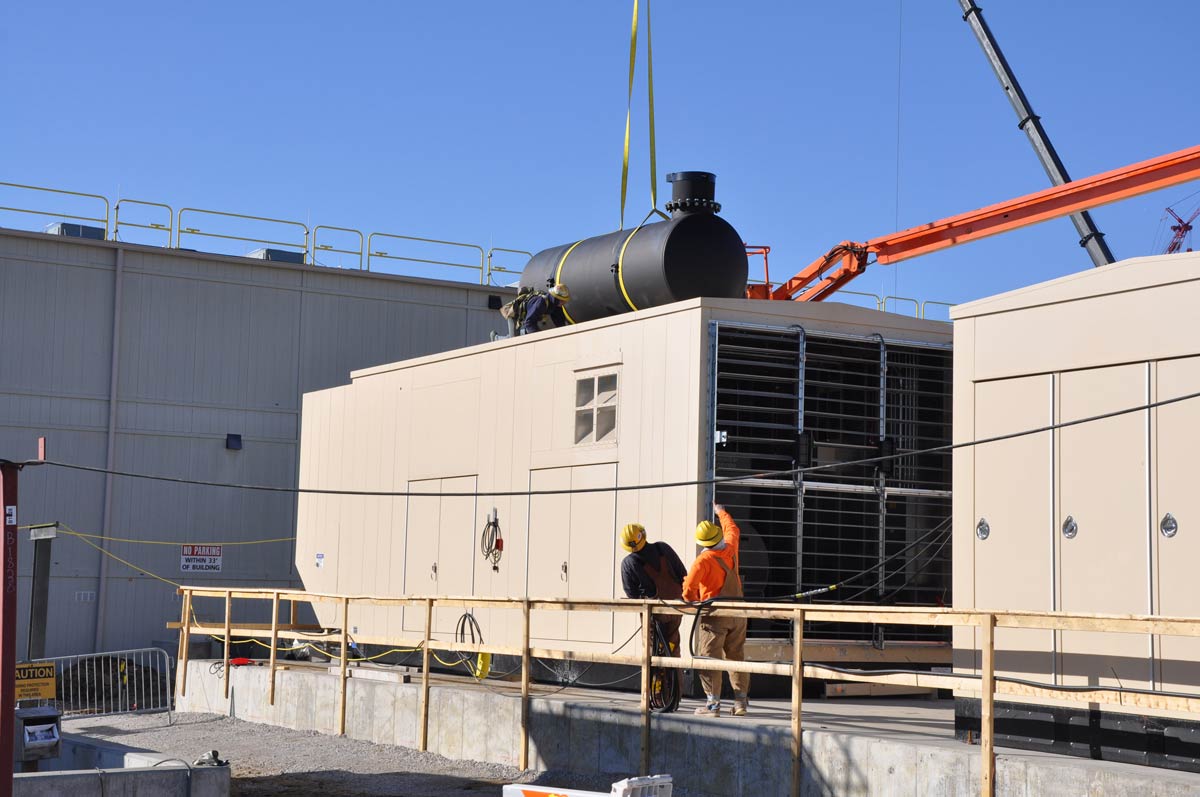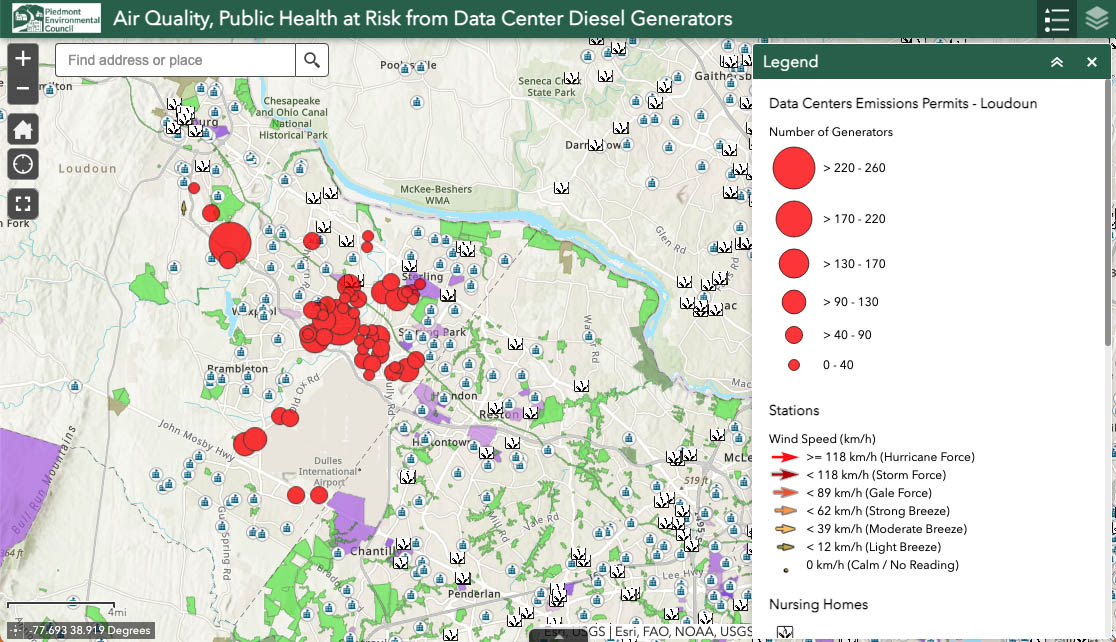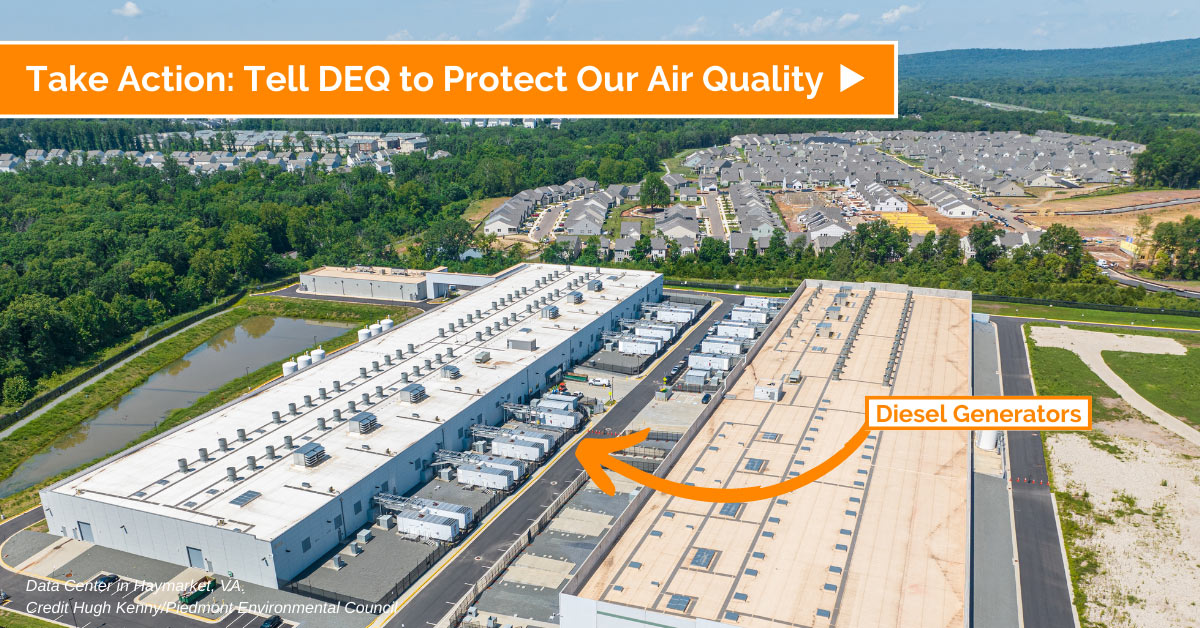The following text was sent out via email on March 21, 2023. Sign up for PEC email alerts →
Dear Supporter,
A lot has happened in the weeks since February 27 when the Virginia Department of Environmental Quality (DEQ) held a public hearing on its proposed variance on diesel generators associated with data centers in Northern Virginia. The variance would allow these back-up generators to run more frequently this coming summer during periods of grid stress.
In response to concerns voiced loudly by residents and organizations late last month, DEQ has revised its public notice with additional information, limited the scope of the variance just to data centers in Loudoun County, and extended its comment period through April 21. However, we still have significant concerns about the risks to residents’ health, the environment and the region’s air quality.
But first, thank you to everyone who sent letters to DEQ or spoke up at the public hearing in Woodbridge. Almost all commented against the variance, including local residents, PEC, and partners at the Southern Environmental Law Center, Sierra Club, Prince William Conservation Alliance, Coalition to Protect Prince William, Protect Fauquier and the National Parks Conservation Association. I encourage you to check out the recent coverage in the Bay Journal for a quick summary.
Take action
DEQ will be holding its second public hearing on April 6 in the conference room of the Northern Regional Office, 13901 Crown Court, Woodbridge VA, at 11 a.m. and is accepting comments on the variance through April 21. You can send an email directly to Karen G. Sabasteanski ([email protected]), Office of Air Data Analysis and Planning, with your comments, or use our pre-filled letter. If you’ve already submitted comments, we encourage you to submit them again under this new notice emphasizing any remaining concerns.
Why we’re concerned…
Data centers in Loudoun County have more than 4,000 diesel generators, with the majority in Data Center Alley between Ashburn and Sterling. Under the variance, these diesel generators would be allowed to operate longer and more frequently during the summer ozone season.
What’s unclear is how many would be operating at any given time under the new variance, since DEQ has not provided any analysis/modeling. This makes it impossible to estimate the cumulative impact of the resulting diesel exhaust released in close proximity to homes, schools, nursing homes, hospitals, parks, and recreational facilities. Making matters worse, DEQ also won’t be providing any independent real-time monitoring once the variance moves forward, but will instead rely on the data center industry’s self-reporting.
We are disappointed that our utilities, regulators and elected officials haven’t come up with an alternative to relieve grid stress that doesn’t rely on polluting diesel generators. With such a high concentration of data centers in Loudoun County, this dangerous experiment puts local communities and the larger Washington Metropolitan region’s air quality at risk – more on that below.

Inconsistencies in DEQ’s notice
Currently, diesel generators are permitted by DEQ only for emergency use when there is an electrical grid failure. This variance would further permit them to operate during non-emergency events from April through July of this year, specifically when a “Maximum Generation Emergency/Load Management Alert” or a “Post Contingency Local Load Relief Warning” is declared by PJM Interconnection, the organization that operates the electric grid.
Very confusingly, DEQ has stated it “do[es] not anticipate that any data center will need to use this variance.” To that, we ask, then why move forward with the variance at all?
DEQ states in its public notice that non-emergency events are rare, averaging approximately 24 hours per year from 2018 to 2022. However, we’re not sure where that information comes from and we don’t think averaging the last five years is the appropriate way to project trends for 2023 in light of the rapid pace of data center expansion in the region and Dominion Energy’s reality check on meeting demand last year.
In fact, our review of PJM Interconnection’s alert system shows that system alerts exploded in frequency in 2022. Loudoun County alone experienced nearly 250 hours worth of such events last year; around 140 of those hours happened during that heat wave in May. These system alerts appear to tie to specific portions of the grid where data center campuses are clustered. Dominion Energy is currently moving forward with a transmission line project that will address some of these capacity constraints, but that construction is not due to be completed before 2026 and new data centers are still being added to these areas as we speak.
Mapping air quality impacts

We are continuing to emphasize the potential consequences of this variance for greenhouse gas emissions, particulate matter and ground-level ozone. Permitting such a large number of diesel generators to run outside of existing restrictions during the hot summer months, when air quality is often at its lowest, could have a notable impact on public health.
This kind of air pollution increases the amount and seriousness of lung and heart disease and other health problems, particularly for children, the elderly and those with pre-existing conditions (asthma, pregnancy, COPD, etc.). Yet, as we’ve stated prior, DEQ has failed to provide any evidence that it has adequately projected, assessed or quantified potential air pollutants.
Our newly-released interactive map shows the location of diesel generators that fall under this variance. It is worth taking a close look if you live in or near Loudoun County to see how you might be affected.
Thanks again for your attention to this issue and for taking the time to write to DEQ. We will continue sharing updates as the situation evolves. Our staff and partners are continuing to conduct research to better understand the potential impacts of this variance and the data center industry’s presence in Virginia as a whole.
Sincerely,
Julie Bolthouse
Director of Land Use
[email protected]
540-347-2334 ext. 7042

